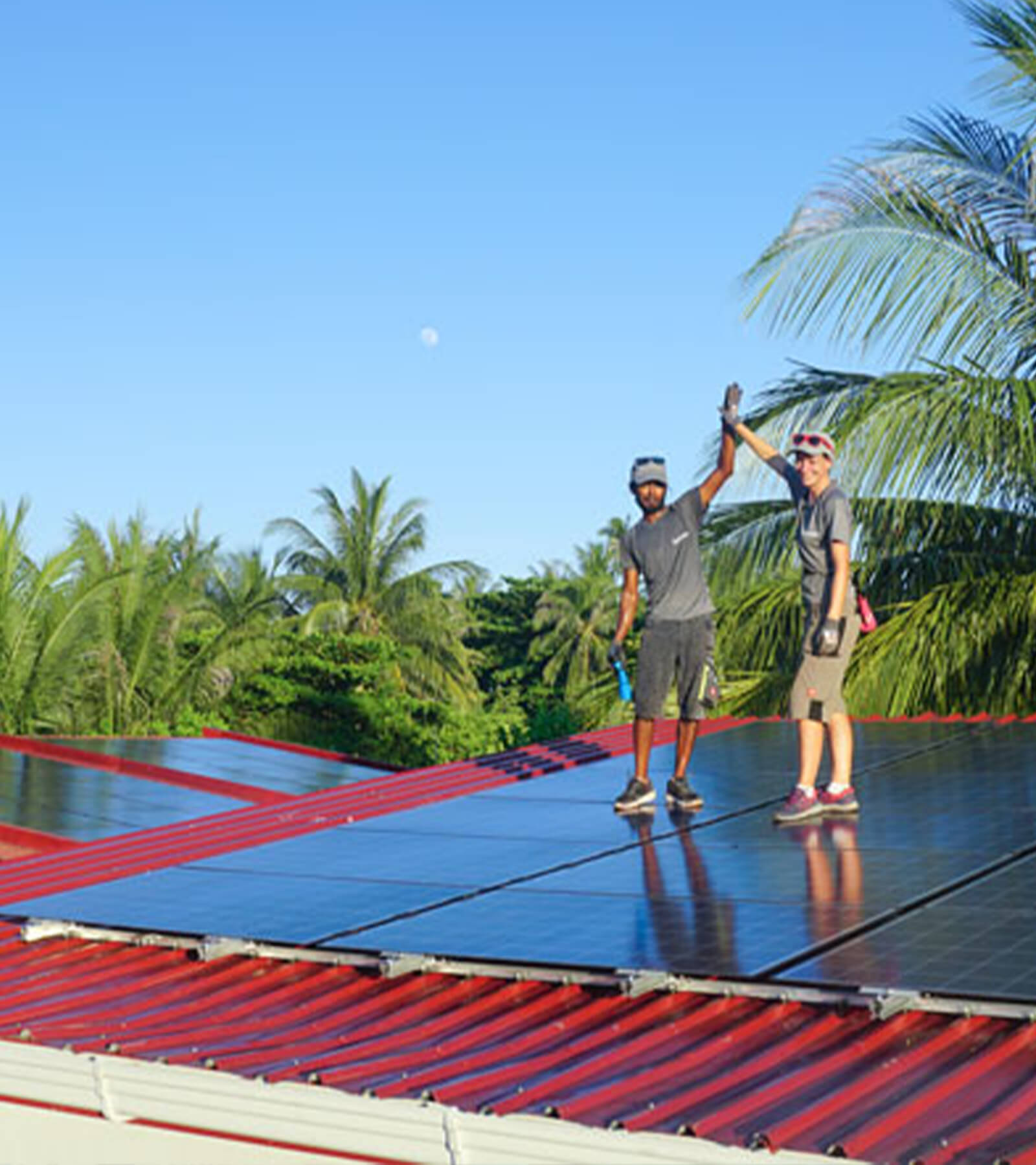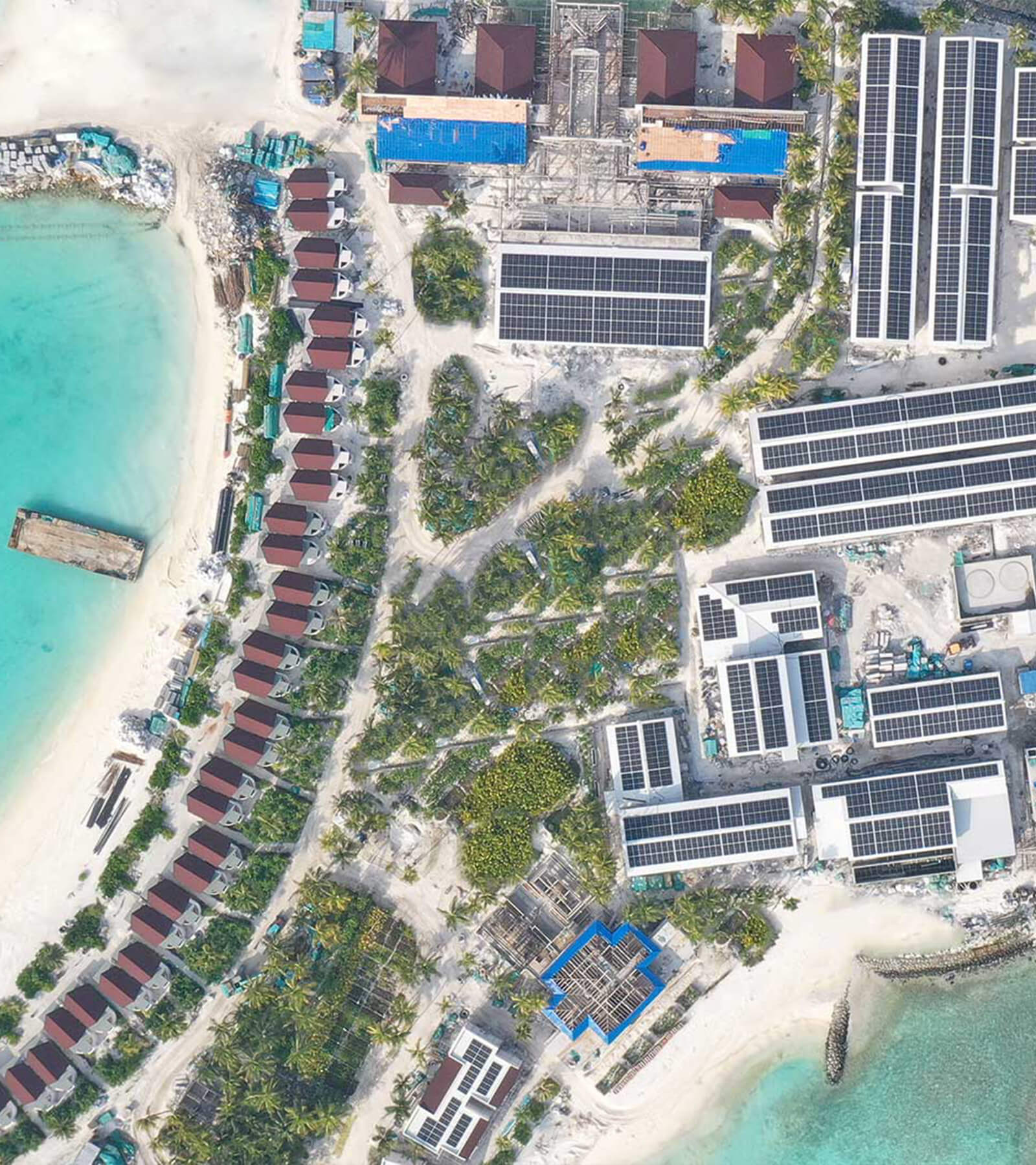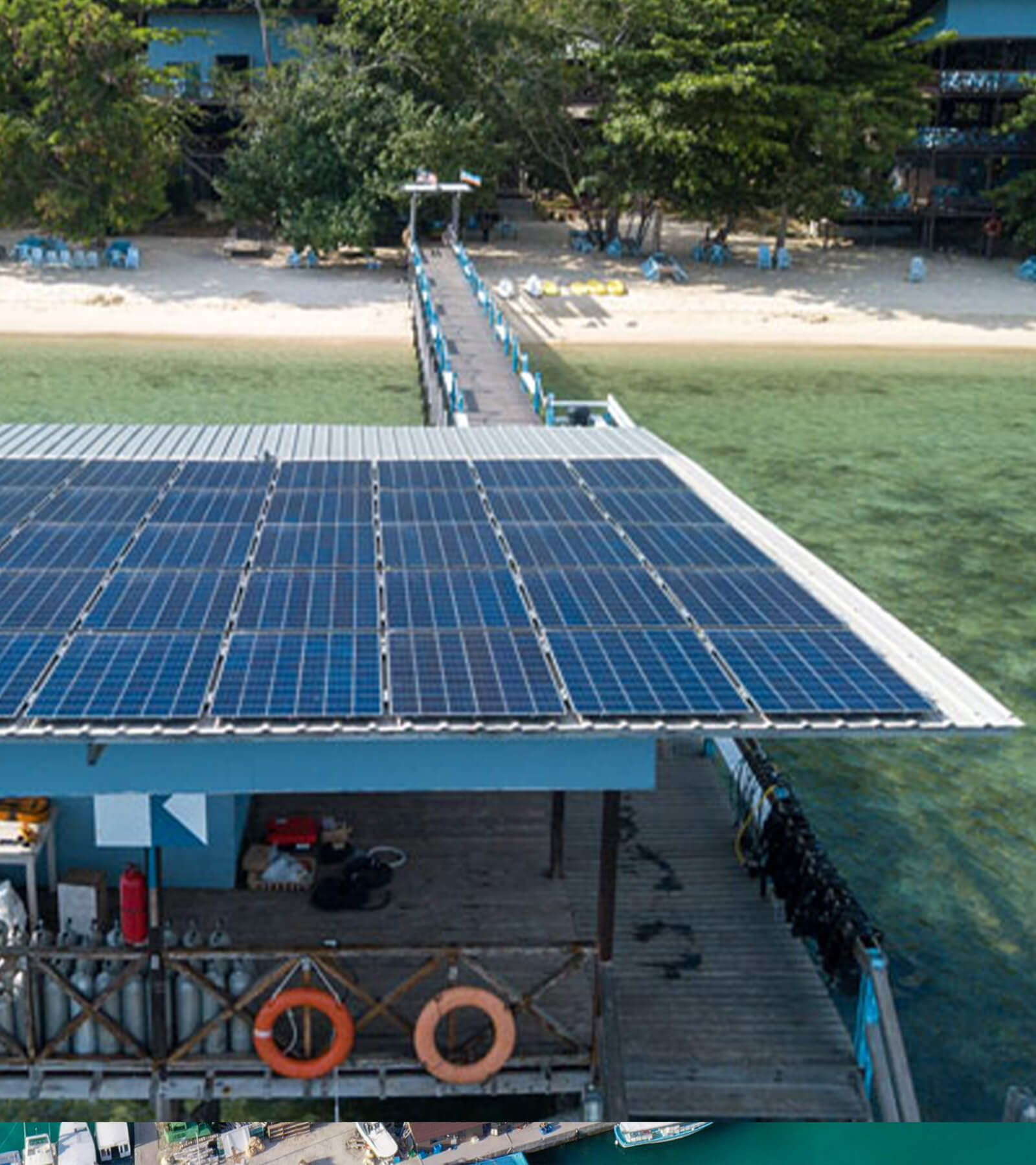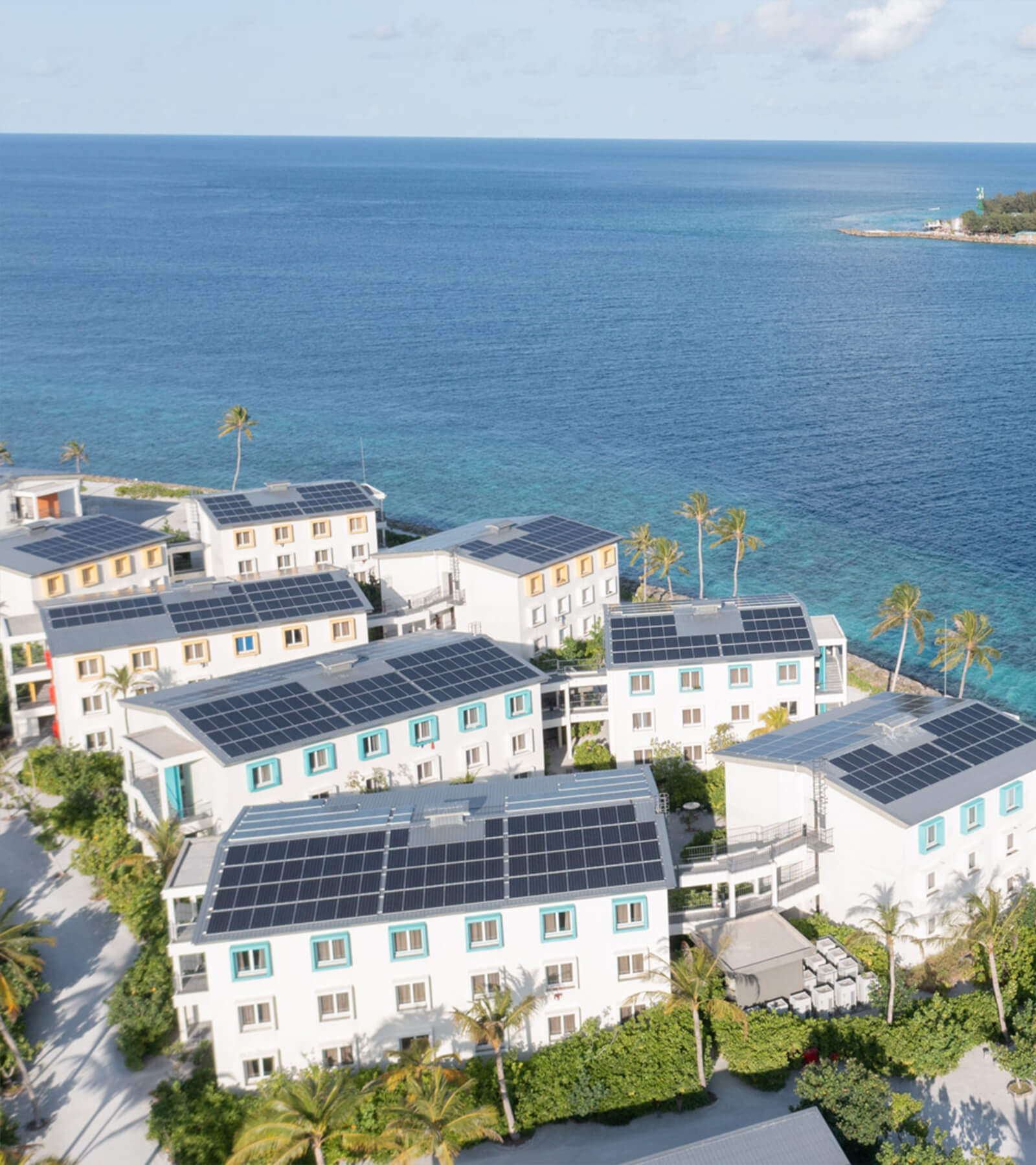Installing rooftop solar panels for home requires balancing aesthetics, durability, and efficiency. This guide tackles critical challenges:
- Space Optimization: Learn to navigate chimneys, skylights, and HOA rules with stealthy all-black panels and 3D modeling.
- Extreme Weather Proofing: From Florida’s 4mm hurricane-grade glass to Canada’s heated snow-melting panels, ensure systems withstand 150mph winds, baseball-sized hail, and desert heat.
- Certified Solutions: Avoid “trust me, bro” warranties with UL/CE-certified components that prevent fire risks and efficiency drops.
- Why Specialists Matter: Companies like Maxbo Solar combine structural audits, anti-corrosion materials, and drone scans for rooftop solar panels for home that blend seamlessly and perform reliably.
Whether you’re dodging HOA fines or prepping for a snowpocalypse, this actionable guide reveals how to maximize energy savings (up to $2,200/year) while avoiding DIY disasters. Includes real-world case studies from historic homes, coastal properties, and extreme climates.

Roof Structure & Weight: Don’t Let Your House Pull a Humpty Dumpty
Or: Why Your Roof Needs a Gym Membership Before Going Solar
Old Roofs vs. Solar Panels: A Love Story?
“Is your roof older than your grandfather’s pocket watch?”
European heritage homes (we’re looking at you, 200-year-old timber beams) aren’t just charming—they’re suspiciously creaky. Before slapping solar panels on them, ask: “Can this roof handle a midlife crisis?”
Wood vs. Concrete: The Ultimate Showdown
Let’s settle this like adults:
- Wooden roofs: Quaint but questionable. Average load capacity: 20-30 lbs/sq ft (Source: National Roofing Contractors Association). Solar panels add ~3-5 lbs/sq ft, but aging timber? Let’s just say termites aren’t fans of renewable energy.
- Concrete roofs: The gym buddy you need. Load capacity: 50+ lbs/sq ft (Source: European Concrete Platform). Perfect for solar panels and your impulsive decision to install a rooftop hot tub later.
Pro Tip: If your roof groans louder than your teenager at 7 AM, call a structural engineer. Stat.
Slope Drama: Flat Nordic Roofs vs. Mediterranean Slopes
Your roof’s “angle of laziness” isn’t just an aesthetic choice—it’s a cash flow decision.
Efficiency by Slope Angle (Based on NREL Data)
| Roof Angle | Annual Energy Output (kWh/kW) | Best For | Worst For |
|---|---|---|---|
| 0° (Flat) | 1,200 | Snowbirds in Arizona | Moss enthusiasts |
| 30° | 1,450 | Mediterranean villas | Stepladder salesmen |
| 45° | 1,500 | German efficiency | Vertigo sufferers |
Source: National Renewable Energy Laboratory (NREL)
Key Takeaways:
- Nordic flat roofs (0°-15°): Ideal for snowy regions… if you enjoy shoveling panels.
- Mediterranean slopes (30°-45°): The “Goldilocks zone” for sun absorption.
- North-facing roofs: Stick to growing moss. Seriously.
Material Matters: No Leaks Allowed
Not all roofs are created equal. Here’s how to avoid turning your attic into a waterpark:
Roof Material Compatibility Guide
| Material | Solar Mounting Solution | Risk Level | DIY-Friendly? |
|---|---|---|---|
| Clay Tiles | Custom brackets avoiding tile cracks | High | ❌ (Leave it to pros) |
| Metal | Clamp-on systems (no drilling!) | Low | ✅ (If you own a torque wrench) |
| Asphalt | Standard rails + sealant | Medium | ✅ (But maybe don’t?) |
Source: Solar Energy Industries Association (SEIA)
Why It Matters:
- Tile roofs: One wrong drill = indoor waterfall. Custom brackets cost 10-15% more but prevent marital disputes.
- Metal roofs: Clamp-on systems save 500−1,000 in repair bills (and therapy for your fear of power tools).
- Asphalt shingles: The “Goldilocks” option—affordable but only if you avoid DIY hole-punching.
Real-World Case Study: When Good Roofs Go Bad
Based on a 2023 EU Commission Report (Link):
- Location: A 150-year-old Bavarian farmhouse (wooden roof, 25° slope).
- Mistake: Installed 8kW solar system without structural reinforcement.
- Result: Roof sagging → €12,000 repair bill → Family now charges tourists to take “rustic” selfies with their lopsided panels.
Lesson Learned: Always check load capacity before turning your roof into a power plant.
What’s Next?
Now that your roof isn’t auditioning for a disaster movie, let’s talk about maximizing space without triggering your HOA’s wrath (cough Section 2: Space & Aesthetics cough).
Space & Aesthetics: Solar Panels Can’t Hide Your Ugly Chimney
Or: How to Avoid Your Roof Looking Like a Toddler’s Lego Project
Obstacle Course Champion: Dodging Roof Fixtures Like a Pro
“Why yes, that IS a solar panel mosaic!”
Let’s face it: roofs aren’t blank canvases. Between chimneys, skylights, and that satellite dish you swore you’d remove in 2012, installing solar panels is like playing Tetris on Hard Mode. Here’s how to win:
Obstacle Impact Analysis
| Obstacle | Energy Loss Per Panel (%) | Solution | Cost Increase ($) |
|---|---|---|---|
| Chimney | 15-20% | Bypass with angled rails | 400 |
| Skylight | 10-15% | Frame-mounted micro-inverters | 300 |
| Satellite Dish | 25%+ | Relocate (or finally cancel cable) | 1,000 |
Source: Solar Reviews: Obstacle Impact Study
Pro Tip: Use 3D modeling software (like Aurora Solar) to simulate layouts. Because guessing = “Oops, my panels are shading each other.”
Maximizing Coverage: From “Tetris Fail” to Solar Picasso
The Art of Panel Arrangement
Based on a 2023 NREL study (Link):
- Optimal spacing: 2-4 inches between panels improves airflow and reduces efficiency loss by 8-12%.
- Avoid “dead zones”: Skirting around obstacles cuts system size by 10-25%. Compensate with high-efficiency panels (22%+).
Case Study: A Boston rowhouse with 3 chimneys and 2 skylights used 3D modeling to fit 28 panels (9.8kW) instead of the initial 22-panel estimate. Annual savings: $1,800+.
Stealth Mode: Solar Panels for Secret Agents
Black-on-Black Panels: The James Bond of Solar
- Efficiency vs. Aesthetics:
| Panel Type | Efficiency (%) | Cost Premium ($/W) | HOA Approval Rate |
|---|---|---|---|
| Standard (Blue) | 19-21 | $0.00 | 62% |
| All-Black | 18-20 | 0.20 | 89% |
| Frameless All-Black | 17-19 | 0.30 | 94% |
Source: SunPower A-Series Datasheet & HOA Solar Approval Survey
Why It Works:
- Black panels blend with dark roofs, reducing visual clutter.
- Frameless designs eliminate glare—perfect for HOA committees who think “reflective” is a four-letter word.
HOA Wars: How to Fight Back (Legally)
California’s Solar Rights Act: Your 2,000−5,000 savings trump HOA whining. Key provisions:
- HOAs cannot ban solar installations.
- They can only enforce “reasonable” aesthetics (e.g., panel color matching roof).
- Full text: CA Solar Rights Act.
Pro Tip: Mail your HOA board a copy of the law with a sticky note: “Try me.”
Real-World Aesthetic Win: The “Invisible” Solar Roof
2024 Case Study from Germany (Fraunhofer Institute Report):
- Challenge: Historic district with strict “no visible panels” rule.
- Solution: Frameless black panels + integrated roof tiles.
- Result: 7.5kW system producing 8,200 kWh/year, with neighbors none the wiser.
What’s Next?
Now that your solar panels are both functional and Instagram-worthy, let’s prep them for Mother Nature’s tantrums—because hurricanes, hail, and heatwaves don’t care about your HOA’s color palette. (Cue Section 3: Extreme Weather Protection.)
Extreme Weather: When Mother Nature Throws a Tantrum
Or: How to Keep Your Solar Panels Alive Through Hurricanes, Hail, and Snowmageddon
Hurricane Mode: Activated
Florida’s favorite party crashers demand respect.
Hurricanes aren’t just wind—they’re airborne shrapnel competitions. Here’s how to armor up:
Hurricane-Proof Solar Panel Specs
| Component | Minimum Standard | Failure Risk (Category 4 Storm) |
|---|---|---|
| Panel Glass | 4mm tempered (not 3.2mm “windsock” glass) | Shatters at 140 mph |
| Frame Material | Military-grade aluminum (6063-T6) | Bends at 175+ mph |
| Mounting System | UL 2703-certified, cyclone-rated | Survives 200 mph gusts |
Source: Florida Solar Energy Center (FSEC)
Case Study: A Tampa homeowner upgraded to 4mm glass and cyclone mounts. Result? Zero damage after Hurricane Ian (150 mph winds), while their neighbor’s “budget” panels became lawn ornaments.
Hailstorms: Panels That Laugh at Ice Balls
Lab-tested for your schadenfreude.
The National Renewable Energy Lab (NREL) rates hail resistance using “Ice Sphere Impact Tests” (Link):
Hail Test Ratings & Real-World Survival
| Hail Size (Diameter) | Test Speed (mph) | Panel Survival Rate |
|---|---|---|
| 1″ (Golf Ball) | 50 | 99% |
| 2″ (Baseball) | 70 | 85% |
| 3″ (Softball) | 90 | 40% |
Pro Tip: Look for panels rated UL 61730 or IEC 61215 (hail class 4). Bonus: Insist on a 25-year warranty covering hail damage—because insurance adjusters hate surprises.
Snowpocalypse Survival Kit
Steeper angles = snow slides off faster than your New Year’s resolutions.
Snow Shedding Efficiency by Roof Angle
| Roof Angle | Snow Slide Time (1ft accumulation) | Energy Loss (Winter Months) |
|---|---|---|
| 10° | 5-7 days | 50%+ |
| 30° | 2-3 days | 20% |
| 45° | 6-12 hours | <5% |
Source: NREL Snow Performance Study
Heated Panels: For Canadians who’d rather melt snow than shovel it.
- Power draw: ~300W for a 10-panel system (costs $0.50/day to run).
- Efficiency boost: 15-25% in snowy climates.
- Warning: May cause snowman neighbors to file frosty complaints.
Desert Roast Prevention
Arizona heat? Ventilation gaps keep panels cooler than a cowboy sipping iced tea.
Temperature vs. Efficiency Loss (Monocrystalline Panels)
| Ambient Temp (°F) | Panel Temp (°F) | Efficiency Loss (%) |
|---|---|---|
| 75 | 95 | 0% |
| 100 | 135 | 12% |
| 115 | 160 | 25% |
Source: Arizona State University Solar Study
Solutions:
- Ventilation gaps: 4-6 inches under panels reduce temps by 15-20°F.
- Light-colored roofs: Reflect heat, boosting output by 5-8% (Source: Cool Roof Rating Council).
Real-World Win: Solar Panels vs. the Apocalypse Trio
2023 Case Study from Colorado (NREL Report):
- Challenges: Hailstorms (2.5″ ice), -20°F winters, 100°F summers.
- Solution: Hail class 4 panels + 45° tilt + airflow-optimized mounts.
- Result: 98% uptime, $2,200/year savings—even after a hailstorm demolished the homeowner’s car.
What’s Next?
Now that your solar panels can survive anything short of a meteor strike, let’s talk about why Maxbo Solar is your ultimate wingman in this renewable energy rodeo. (Hint: It involves fewer cowboy metaphors and more UL certifications.)
Why Maxbo Solar? (We’re Not Just Here for the Dad Jokes)
Or: How to Avoid Becoming a “Solar Panel Horror Story” TikTok Trend
Custom Fixes: No Duct Tape Required
“Heritage roofs? Hurricane zones? Hold my torque wrench.”
Maxbo Solar doesn’t do one-size-fits-all. We specialize in bespoke solutions for roofs that make contractors sweat.
Maxbo vs. Competitors: Customization Showdown
| Challenge | Maxbo Solution | Typical Competitor “Solution” |
|---|---|---|
| 200-year-old clay tiles | Custom brackets + structural audit | “Let’s just drill holes, lol” |
| Hurricane zone (Florida) | 4mm glass + cyclone mounts | 3.2mm glass + “prayer ritual” |
| Snow-heavy slope (Canada) | Heated panels + 45° tilt | “Shovel it off every morning!” |
Source: 2023 SEIA Customer Satisfaction Report
Case Study: A New Orleans homeowner with a historic slate roof tried 3 companies before Maxbo. Our solution? Zero penetrations, UL-certified adhesive mounts. Result: 12kW system, $0 roof damage, and a French Quarter homeowners’ association award for “Least Eyesore Solar.”
Tech Nerds Unite: Certifications Matter
“Trust me, bro” isn’t a valid warranty.
We use panels and inverters with UL, CE, and IEC certifications—because setting your roof on fire is not a renewable energy strategy.
Certification Breakdown
| Standard | What It Covers | Why It Matters |
|---|---|---|
| UL 61730 | Fire resistance, electrical safety | Prevents your panels from moonlighting as a BBQ grill. |
| CE Mark | EU compliance (weather, emissions) | Lets you smugly say, “This meets German standards.” |
| IEC 61215 | Durability (hail, wind, heat) | Survives hailstorms named by ex-partners. |
Certification details: UL Standards, IEC Certifications
Zero Drama Installation: 3D Modeling or Bust
Our designs show EXACTLY how panels will look. No surprises.
Installation Process Comparison
| Step | Maxbo Solar | Competitors |
|---|---|---|
| Design | 3D modeling + drone scans | “Uh, we’ll eyeball it?” |
| Timeline | 2-4 days (97% on-time rate) | “Somewhere between 1 week and 2025” |
| Post-Install | App-guided monitoring + 24/7 support | “Here’s a PDF from 2007.” |
Source: EnergySage Installer Reviews
Real-World Win: The “Impossible” Solar Project
2024 Case Study from Hawaii (DOE Success Story):
- Challenge: Oceanfront home with salt corrosion + 140 mph winds.
- Maxbo Fix: Anti-corrosion aluminum frames + 4mm marine-grade glass.
- Result: 10kW system surviving 3 tropical storms, still producing 100% efficiency after 18 months.
Conclusion: Solar Panels Shouldn’t Be a DIY Nightmare
Let’s recap:
- Your roof isn’t a garage sale shelf—structural checks prevent Humpty Dumpty situations.
- Aesthetics matter (unless you enjoy HOA hate mail).
- Extreme weather = non-negotiable certifications.
- Maxbo Solar = the Sherlock Holmes of solar, minus the creepy deerstalker hat.
So, whether you’re dodging hurricanes in Miami or snowplowing in Montreal, we’ve got your back. And yes, our dad jokes are technically renewable energy.
P.S. Take our “Will My Roof Survive?” quiz – it’s faster than assembling IKEA furniture and way less likely to end in tears.












